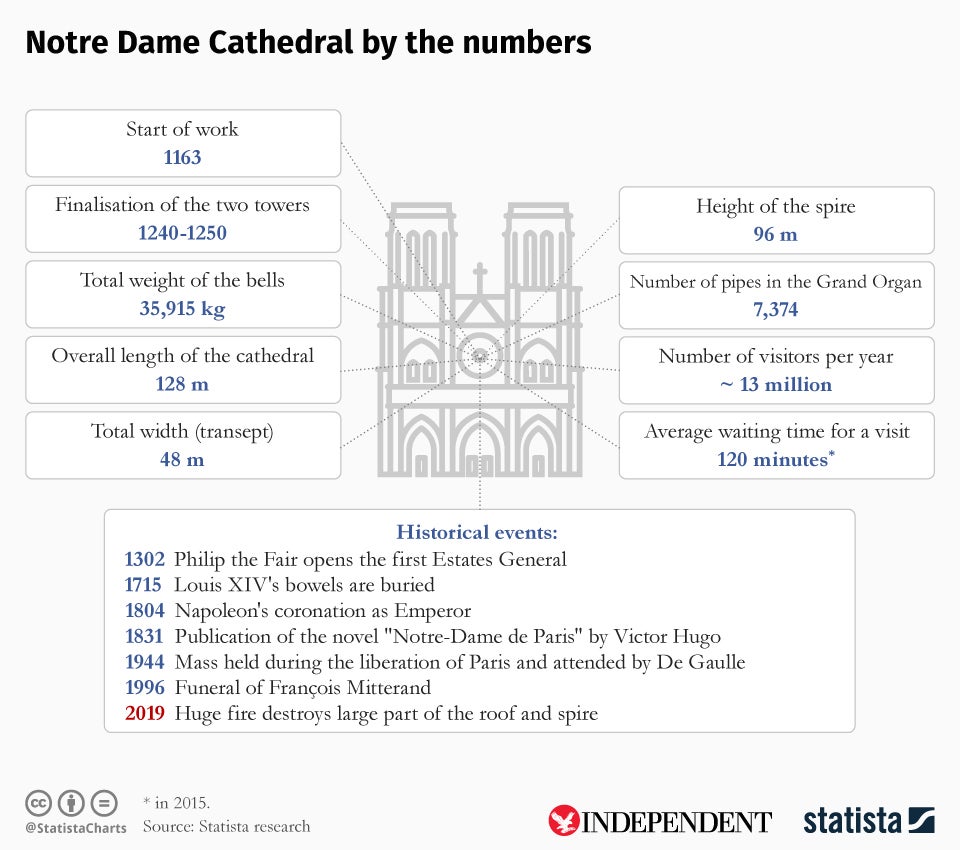Notre Dame fire: How did the blaze start and what will happen now?
Police launch investigation into "involuntary destruction by fire" as officials review damage
Your support helps us to tell the story
From reproductive rights to climate change to Big Tech, The Independent is on the ground when the story is developing. Whether it's investigating the financials of Elon Musk's pro-Trump PAC or producing our latest documentary, 'The A Word', which shines a light on the American women fighting for reproductive rights, we know how important it is to parse out the facts from the messaging.
At such a critical moment in US history, we need reporters on the ground. Your donation allows us to keep sending journalists to speak to both sides of the story.
The Independent is trusted by Americans across the entire political spectrum. And unlike many other quality news outlets, we choose not to lock Americans out of our reporting and analysis with paywalls. We believe quality journalism should be available to everyone, paid for by those who can afford it.
Your support makes all the difference.The devastating fire that partially destroyed Paris’ Notre Dame cathedral and shocked the world has provoked widespread mourning and calls for answers.
Official have been cautious about speculating on the cause of the fire, but Paris prosecutor Remy Heitz said there is no evidence of arson.
An investigation has been opened into “involuntary destruction by fire” after the cultural and historical landmark’s spire and much of its roof were consumed in the blaze.
Le Bras Freres, the company carrying out the cathedral's restoration, have said it will cooperate fully with the investigation and police have already begun questioning workers.
“All I can tell you is that at the moment the fire began none of my employees were on the site. We respected all procedures," Julien Le Bras, a representative for the firm, said.
This is what we know so far about the fire:
How did the fire start?
At 5.20 pm (UK time), calls was reportedly sent to emergency services referring to a fire in the attic of the cathedral. However, no fire was found after checks.
Just before 6 pm, a second alarm was triggered with a fire found under the roof.
The fire spread quickly across the roof and shortly before 7 pm, the cathedral’s spire toppled.
Early on Tuesday morning, a spokesperson for the Paris fire service announced that the fire had been completely extinguished.
The exact cause of the fire has yet to be determined.
No-one was killed but a firefighter and two police officers were injured, according to officials.
Jonathan Barnett, a fire safety expert, told The New York Times that “once these massive timber structures start to burn, they almost never can be stopped.”
Other safety experts have noted that cathedrals like Notre Dame are particularly at risk of fires, due to large sections being made of flammable material which are often difficult to reach.
The Notre Dame is also located on a small island, Île de la Cité, in the centre of Paris. This could have made access more difficult for the 500 or so firefighters who tackled the blaze.
Why were there renovations?
The Notre Dame was undergoing a £5.2m renovation on the church's central spire at the time of the fire.

Renovations were announced after cracks began appearing in the cathedral's stone, raising concerns that the structure could become unstable.
The cathedral's buttresses had been weakened by years of rain, snow and pollution, and officials worried the whole building was at risk of collapsing.
What was damaged in the fire?
The cathedral’s structure, including its two front towers, has been mostly saved but two-thirds of its roof was destroyed in the fire.
The central spire was also destroyed.
However, the Notre Dame’s stained glass windows and church organ appear to have been left undamaged, according to officials from the cathedral.
The most sacred artworks and artefacts stored in the building, including the Crown of Thorns, were largely salvaged and have now been transferred to the Louvre Museum.
What is going to happen now?
French president Emmanuel Macron announced last night that the Notre Dame would be rebuilt with an international fundraising campaign.
Hundreds of millions of pounds have already been pledged.
Billionaires François-Henri Pinault – husband of Hollywood star Salma Hayek – and Bernard Arnault have said they will give €100m (£86m) and €200m (£173m) respectively to fund the rebuild.
However, the restoration process will take years. The cathedral required an estimated £130m for repairs before the fire and early estimates suggest it could take decades to return the Notre Dame to its former glory.
Peter Fuessenich, the chief architect for Cologne cathedral in Germany, told broadcaster RTL:
"It will certainly take years, perhaps even decades, until the last damage caused by this terrible fire will be completely repaired."

Join our commenting forum
Join thought-provoking conversations, follow other Independent readers and see their replies
Comments